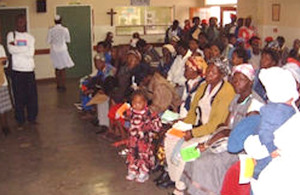DFID Research: Anti-retroviral treatment of HIV/AIDS in Africa is best delivered in health centres
A new study by the DFID and Elton John Aids Foundation-funded COMDIS programme showns the value of local care in treating HIV/AIDS patients.

Patients waiting for anti-retroviral treatment. Picture: COMDIS
Community based anti-retroviral treatment (ART) was found to be more acceptable and effective than specialist hospital ART care in studies carried out in rural districts of Lubombo in Swaziland. Researcher Professor John Walley describes how clients often arrived at the nurse-led primary care clinics in very poor condition: “so sick they could barely walk. But they did walk in, and patiently they waited. They had very low CD4 counts [tests critical to assessing immune system function] … so vulnerable to the next infection. Months later they were happy smiling fully well people, carrying their babies and young children to the health centre.”
COMDIS(Communicable diseases: vulnerability, risk and poverty) believe the studies have broad relevance and applicability for the rest of southern Africa - the hospital and health centres in the study were deliberately chosen to include a typical mixture of government and NGO facilities. The research was conducted using the resources, staff, tests, drugs, and facilities already present in what was a typical district setting, so that results could be easily replicated. Studies were mainly carried out by the local health workers, and were only supported by COMDIS staff where necessary.
Alongside this trial COMDIS successfully trialed a novel support group. Peer supporters who were also patients became empowered to provide community education, help out at the hospital and health centre clinics, as well as support fellow clients in the village.
These successful interventions have already been replicated at other health centre areas, and are being implemented across the Lubombo region.